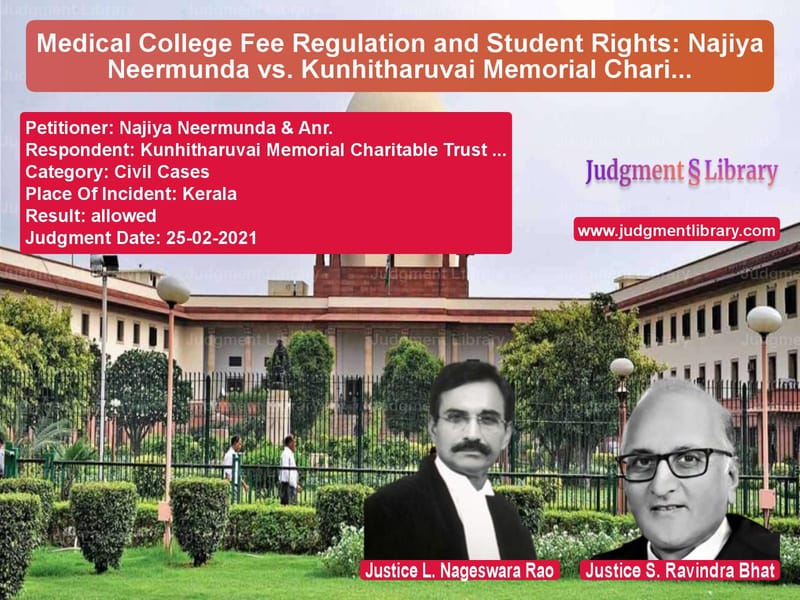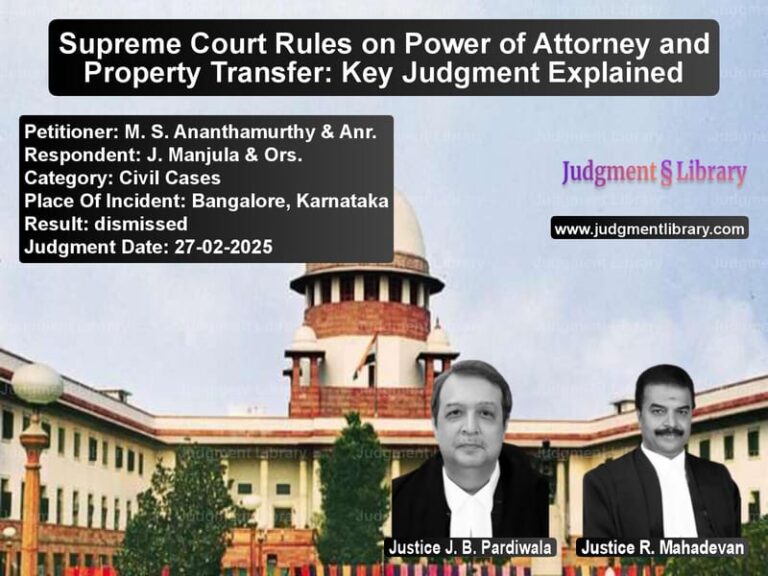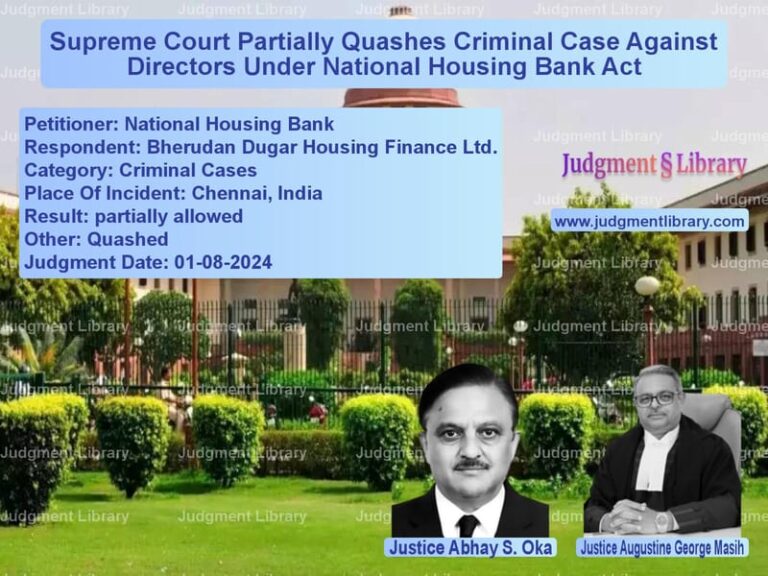Medical College Fee Regulation and Student Rights: Najiya Neermunda vs. Kunhitharuvai Memorial Charitable Trust
The case of Najiya Neermunda & Anr. vs. Kunhitharuvai Memorial Charitable Trust & Ors. is a significant judgment concerning the regulation of tuition fees in private medical colleges in Kerala. The dispute arose when the Admission and Fee Regulatory Committee fixed the fee for MBBS courses in self-financing medical institutions, leading to legal challenges from the colleges and students.
Background of the Case
The Kerala government enacted the Kerala Medical Education (Regulation and Control of Admission to Private Medical Educational Institutions) Act, 2017, which gave powers to the Admission and Fee Regulatory Committee to regulate tuition fees in private medical colleges. The Committee initially set a provisional fee of Rs. 5 lakh for MBBS students, which was challenged in the High Court.
The High Court ruled that while the Committee had the power to ensure that fees were reasonable, it could not arbitrarily fix fees without considering the financial data provided by the colleges. The colleges were required to submit audited accounts for review.
Following this, the Committee determined the final fee for MBBS courses for 2017-18 and 2018-19. However, private self-financing medical colleges filed fresh petitions in the High Court, arguing that the Committee had exceeded its jurisdiction by determining fees that did not account for the actual expenditure incurred by institutions.
Key Legal Issues
- Whether the Admission and Fee Regulatory Committee had the power to independently determine tuition fees.
- Whether the fixed fee structure was arbitrary and lacked consideration of financial data from colleges.
- Whether the Committee should have accepted the tuition fees proposed by colleges.
Arguments by the State of Kerala
- The State of Kerala argued that the Committee had the authority under the 2017 Act to ensure that fees were not excessive or exploitative.
- The State contended that the Committee’s fee determination was fair and protected students from exorbitant fees.
- It was also argued that the colleges had failed to provide sufficient financial records justifying higher fees.
Arguments by Private Medical Colleges
- The colleges argued that they had the right to determine tuition fees and that the Committee’s role was limited to preventing profiteering.
- They contended that their proposed fees were based on operational costs, infrastructure development, and faculty salaries.
- The colleges also claimed that the Committee had unfairly rejected financial data submitted to justify higher fees.
Supreme Court’s Analysis
The Supreme Court examined the extent of the Committee’s authority and the fairness of the fee regulation process.
- “The Committee has the power to examine whether the fee proposed by the managements of private self-financing medical colleges was not excessive and non-exploitative.”
- “The Committee must review audited accounts to ensure that the institutions are not indulging in profiteering.”
- “The Committee cannot go into the desirability or appropriateness of the expenses incurred by the institution as per its own notions.”
The Court also noted that the Committee had failed to give adequate time for colleges to present their financial statements and observed that the fee fixation process was not sufficiently transparent.
Final Judgment
The Supreme Court upheld the High Court’s decision to remand the matter back to the Committee, directing it to reconsider the fee fixation process.
- The Committee was required to reassess tuition fees based on audited accounts submitted by the colleges.
- Medical institutions were directed to submit clear financial records justifying their proposed fees.
- The Court emphasized that students should not bear the burden of arbitrary fee hikes.
Conclusion
This judgment reaffirms that regulatory bodies have the authority to prevent exploitative tuition fees while ensuring that private institutions have the financial means to operate effectively. It also highlights the importance of transparency and accountability in medical education fee structures.
Petitioner Name: Najiya Neermunda & Anr..Respondent Name: Kunhitharuvai Memorial Charitable Trust & Ors..Judgment By: Justice L. Nageswara Rao, Justice S. Ravindra Bhat.Place Of Incident: Kerala.Judgment Date: 25-02-2021.
Don’t miss out on the full details! Download the complete judgment in PDF format below and gain valuable insights instantly!
Download Judgment: najiya-neermunda-&-a-vs-kunhitharuvai-memori-supreme-court-of-india-judgment-dated-25-02-2021.pdf
Directly Download Judgment: Directly download this Judgment
See all petitions in Education Related Cases
See all petitions in Public Interest Litigation
See all petitions in Legislative Powers
See all petitions in Contract Disputes
See all petitions in Judgment by L. Nageswara Rao
See all petitions in Judgment by S Ravindra Bhat
See all petitions in allowed
See all petitions in supreme court of India judgments February 2021
See all petitions in 2021 judgments
See all posts in Civil Cases Category
See all allowed petitions in Civil Cases Category
See all Dismissed petitions in Civil Cases Category
See all partially allowed petitions in Civil Cases Category







